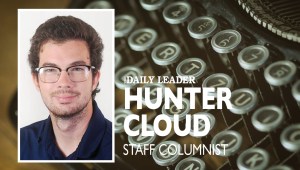On ‘The President and the Press’
Published 7:16 pm Thursday, May 17, 2018
“Without debate, without criticism, no Administration and no country can succeed — and no republic can survive.” — John F. Kennedy
There is a tendency among us humans to think that whatever is happening at any given time is worse than that thing has ever been before.
History doesn’t often support that proposition, but if humans better learned the lessons of history, it would be different and they would be better off.
Trending
As example, let us take the relationship between the President of the United States and the news media — a subject which at present is inspiring Shakespearean levels of sound and fury.
This ain’t new, folks.
It was just over 57 years ago, April 27, 1961, when a fledgling president named John Fitzgerald Kennedy gave an address to the American Newspaper Publishers Association at the Waldorf-Astoria Hotel in New York City.
“I have selected as the title of my remarks tonight ‘The President and the Press,’” Kennedy told the assemblage, “Some may suggest that this would be more naturally worded ‘The President versus the Press,’” Sound familiar?
It was the height of the Cold War and the newly-in-office president sought to strike a balance between the public’s right to know and editorial discretion, something he described as “our common responsibilities in the face of a common danger.”
“The very word ‘secrecy’ is repugnant in a free and open society,” the young president said to the ballroom full of those mostly older than he. “Even today, there is little value in opposing the threat of a closed society by imitating its arbitrary restrictions. Even today, there is little value in insuring the survival of our nation if our traditions do not survive with it. And there is graver danger than an announced need for increased security will be seized upon by those anxious to expand its meaning to the very limits of official censorship and concealment.
Trending
“That I do not intend to permit to the extent that it is in my control,” Kennedy said. “And no official of my Administration, whether his rank is high or low, civilian or military, should interpret my words here tonight as an excuse to censor the news, to stifle dissent, to cover up our mistakes or to withhold from the press and the public the facts they deserve to know.”
Are you listening, President Trump? How about you, Mrs. Sarah Huckabee-Sanders?
And then, though, President Kennedy asked the newspaper folk to look in the mirror.
“But I do ask every publisher, every editor and every newsman in the nation to reexamine their own standards,” he said, suggesting the need for the occasional application of discretion.
“The question is for you alone to answer,” he told them. “No public official should answer it for you. No governmental plan should impose its restraints against your will. But I would be failing in my duty to the nation, if I did not commend this problem to your attention and urge its thoughtful consideration.”
That, by the way, is how a president gets the attention of the press. That is a lot more effective than calling them “horrible people” and “enemies of the American people.”
The editorial pages of the large and influential Hearst newspaper chain, the Fox News of its time, were giving Kennedy holy hell, suggesting he was soft on communism, hopelessly naive and subject to selling the country down the river at the drop of a hat, tipping it himself.
Kennedy essentially asked the press to be responsible and consider the consequences of what they reported—no more or less than what it should do.
But he also made it clear that the ultimate responsibility to be honest and open lay with the government. “No president should fear public scrutiny of his program. For from that scrutiny comes understanding, and from that understanding comes support or opposition. Both are necessary.”
Leaders welcome scrutiny; would-be despots demand fealty.
“Without debate, without criticism, no Administration and no country can succeed — and no republic can survive. That is why the Athenian lawmaker Solon decreed it a crime for any citizen to shrink from controversy. And that is why our press was protected by the First Amendment — the only business in America specifically protected by the Constitution — not primarily to amuse and entertain, not to emphasize the trivial and the sentimental, not to simply ‘give the public what it wants’ — but to inform, to arouse, to reflect, to state our dangers and our opportunities, to indicate our crises and our choices, to lead, mold, educate and sometimes even anger public opinion.”
Good words, those. Wise words. Words which both those who make the news and those who cover it would do well to take to heart.
Ray Mosby is editor and publisher of the Deer Creek Pilot in Rolling Fork.





